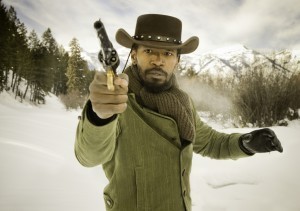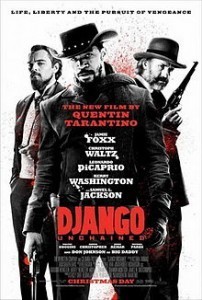Django Unchained – A Review
I don’t want to unduly upset or unsettle any of my white friends, but I’ve daydreamed about killing white people. After watching Roots. After thinking about the crack of the whip on the back of slaves. After reading about lynchings. After thinking about hoses being turned on us. After I tried researching my family tree and had to sift through receipts. After every time I’ve heard the word nigger. Do not delude yourself into thinking that the pain isn’t more fresh that you’d like to believe no matter how post-racial the age you think we’re in. This is why Quentin Tarantino’s Django Unchained, while every bit a spaghetti western, feels like an empowerment vehicle, capturing a zeitgeist people are too blind to acknowledge.
After Kill Bill and Inglourious Basterds, it would be easy to see Django Unchained as their love child, yet another chapter in Tarantino’s revenge fantasy series. Like with Basterds, he is walking that line of writing an entertaining romp against the backdrop of genocide level human tragedy as too much lingering on the brutality of the time and the film could end up feeling exploitative. Considering the state of race relations in this country, especially in the wake of a contentious presidential election, this is made doubly problematic. His brand of pastiche, borrowing whole-handedly from westerns like Sergio Leone’s archetypal Man with No Name (as portrayed, for example, by Clint Eastwood in A Fistful of Dollars, For a Few Dollars More, and The Good, the Bad, and the Ugly) might not seem the best way to delve into this territory. On the flip side, I don’t recall anyone getting mad than none of the Eastwood trilogy comments on slavery.
“The way the slave trade deals in human lives for cash, bounty hunters deal with corpses.” – Dr. King Schultz (Christoph Waltz)
 There is still the lingering specter of deriving entertainment, much less outright laughs, against the backdrop of slavery. There is a scene involving the Ku Klux Klan that recalls a Mel Brooks movie and the N-word is dropped some 109 times, in many instances to laughs (with Samuel L. Jackson as a live action Uncle Ruckus named Steppin, I mean, Stephen). Despite the voyeuristic horror of the brutality, Django Unchained is a long way from a movie like, say, Mandingo. Django Unchained consistently uses a person’s racism against them, including reducing bigots to buffoons in the aforementioned KKK scene. Like with Inglourious Basterds, the last 20 minutes of the movie is completely a bloodbath of revisionist comeuppance (the movie, in fact, being a very long countdown to it).
There is still the lingering specter of deriving entertainment, much less outright laughs, against the backdrop of slavery. There is a scene involving the Ku Klux Klan that recalls a Mel Brooks movie and the N-word is dropped some 109 times, in many instances to laughs (with Samuel L. Jackson as a live action Uncle Ruckus named Steppin, I mean, Stephen). Despite the voyeuristic horror of the brutality, Django Unchained is a long way from a movie like, say, Mandingo. Django Unchained consistently uses a person’s racism against them, including reducing bigots to buffoons in the aforementioned KKK scene. Like with Inglourious Basterds, the last 20 minutes of the movie is completely a bloodbath of revisionist comeuppance (the movie, in fact, being a very long countdown to it).
Slavery is an inconvenient horror for many because it punctures the central conceit of the American Dream in that the freedom promised was built, literally, on the backs of slaves. In Django Unchained, Tarantino uses blaxploitation era movies and remixes them through Corbucci and Peckinpah to create a wonderfully entertaining revenge fantasy. And the movie should be taken simply as that. It can’t truly comment or wrestle to the totality of the horror because that horror is too real and too immense to be dealt with in the movie that was constructed. Vengeance is easy to grasp and derive a vicarious (and very human) thrill response to. It’s ultimately not real, but it’s easy and satisfying in the moment.
[Wondering what it would be like to tackle an immense human tragedy a different way, I thought I’d check out the movie, Fambul Tok.]




